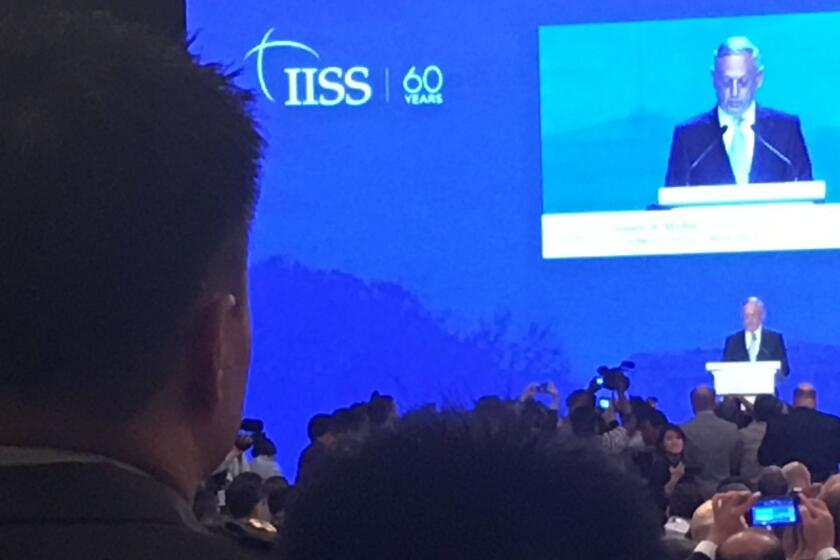Chinese pursuit of MoneyGram raises espionage fears
The proposed acquisition of financial giant MoneyGram by a company with close ties to the Beijing government might be scuppered by rising fears that Chinese spies would exploit the data of U.S. troops and their families to track military movements and identify targets to turn.
The bidding war for Dallas-based MoneyGram pits China’s Zhejiang Ant Small and Micro Financial Services — called Ant — against Euronet Worldwide, a Kansas firm that’s American-owned.
Ant offered $1.9 billion for MoneyGram on Jan. 27. Euronet swept in with a $2 billion bid nearly three months later, but the only deal under tentative agreement is Ant’s.
A spin-off of online retail giant Alibaba, Ant operates in China like America’s PayPal system, but its subsidiaries include an online bank and a money-market fund. Chinese billionaire Jack Ma directs both companies, although it’s believed that about 15 percent of Ant is owned by the Communist government and the sovereign wealth fund it controls.
In a statement to The San Diego Union-Tribune, Ant said no Chinese fund or government agency owns more than 5 percent of the company, that Chinese officials don’t control the business and that they never “participate in Ant’s management or board, nor do they have access to the company’s consumer data or other private information.”
Hackers linked to China’s military and spy agencies are accused of raiding data from both the American government and key national security contractors, including aerospace leader Northrop Grumman and shippers moving U.S. troops and equipment worldwide.
“With MoneyGram, you have a company that routinely provides financial services to Department of Defense personnel. That information can be analyzed and exploited,” said Christopher Swift, a former investigator at the U.S. Treasury Department’s Office of Foreign Assets Control, where he probed international transactions involving terrorist syndicates, weapons smugglers and rogue nations banned from doing business in America.
“This is a merger that involves America’s financial system, and the financial system is part of the critical infrastructure of the United States. On top of that, MoneyGram collects information about Americans and could be a potential source of information to the Chinese government,” added Swift, now a partner at the Washington, D.C.-based legal firm of Foley & Lardner, where he specializes in white-collar litigation, international law and national-security cases.
In its statement, Ant said it had earned the trust of 630 million global customers by protecting their personal information. It pledged to retain all data about Americans on MoneyGram’s servers in the United States and said none of that material would be shared with the company’s China headquarters or Chinese government officials.
“Customer data will be managed by Ant in the same way as it’s managed by MoneyGram today,” the statement read.
MoneyGram’s representatives didn’t return messages seeking comment.
In 2012, the company entered into a deferred prosecution agreement with the U.S. Justice Department after admitting to criminally aiding and abetting wire fraud and failing to maintain an effective anti-money laundering program. MoneyGram forfeited $100 million for “turning a blind eye” to the defrauding of tens of thousands of American citizens and agreed to strengthen its compliance department, according to the agreement.
It’s harder to crack down on Chinese government spying.
In 2014, for example, a federal grand jury indicted five members of People’s Liberation Army Unit 61398 for stealing data from American corporations. The following year, the U.S. Office of Personnel Management announced that Chinese hackers ripped off the records of up to 21.5 million Americans, a treasure trove of data that included details about military personnel and contractors with high security clearances.
Troops and their families using MoneyGram to send money to relatives, friends or others must fill out forms designed to flag financial crimes such as money laundering and wire fraud.
Depending on the type of transaction, customers can disclose a wide range of personal data, including residential addresses, Social Security numbers, birth dates and banking information, plus similar details about the recipient of the funds.
MoneyGram outlets also record information from a client’s passport, driver’s license, national identity card or other government-issued pieces of identification. The info is usually kept for five years in case federal or state bank regulators audit the transactions.
The sheer reach of MoneyGram’s 347,000 outlets or affiliated agents in 200 nations means that it routinely serves military members and their families.
The Union-Tribune counted 20 MoneyGram outlets running in an arc from Temecula Heights past North Island Naval Air Station, San Diego Naval Base and Point Loma’s Third Fleet headquarters to Imperial Beach — where the SEALs are building a new $1 billion compound.
About a dozen MoneyGram outlets are located around Camp Pendleton, and six are situated near Miramar Marine Corps Air Station.
Lemoore Naval Air Station, home to the Navy’s new fleet of F-35C stealthy strike fighters, has a MoneyGram in town. So does Yuma, Arizona, home to the Marine Corps’ F-35B program.
It’s a 10-minute drive from the gates of Vandenberg Air Force Base and its top-secret missile and satellite programs to the nearest MoneyGram.
Euronet executives said they’re worried about the geographic pattern.
“Our team has been in the money transfer business for more than 30 years. We have a keen understanding for the significant amount of personal data that is collected and preserved related to the senders and beneficiaries in these transactions, and the view it provides to the financial sector,” Euronet Chairman and CEO Michael Brown said in a statement to the Union-Tribune. “We also understand the impact on the lives of customers, and the risks were it to be misused by a company or government. Members of Congress, members of a congressional commission and others have raised concerns about such risks in this transaction.”
Two Republican congressmen with sway over America’s policies toward China — Rep. Robert Pittenger of North Carolina and Rep. Chris Smith of New Jersey — have asked whether Beijing would use MoneyGram data to crack down on human-rights dissidents. Ant has rejected their fears.
Other lawmakers told the Union-Tribune they were just learning about the national-security issues dogging the deal. Dayanara Ramirez, spokeswoman for Rep. Juan Vargas, D-San Diego, said her office is “currently waiting to get more information/background on the matter.”
Vargas serves on the House Committee on Financial Services, which could exert oversight regarding the transaction.
The proposed sale of MoneyGram to Ant also could fall victim to a tiny federal agency lodged in the U.S. Treasury Department — the Committee on Foreign Investment in the United States, or CFIUS. That office combines the expertise of 11 federal agencies, including the Pentagon and the Office of the Director of National Intelligence, to weigh purchases of key American companies by foreign businesses.
In 2013, CFIUS helped thwart the sale of a mining company to Chinese investors due to concerns that they would own property too near the Navy’s “top gun” fighter school at Fallon Naval Air Station in Nevada and the Corps’ air station in Yuma.
Four years earlier, the office scuttled a similar Chinese deal to acquire another company with holdings near Fallon. The review cited “serious, significant and consequential national-security issues” raised by senior Pentagon officials.
In addition, President Barack Obama in 2012 barred the Chinese-owned Sany Group from erecting a wind farm near restricted air space at the Boardman test range in Oregon, where the military flies cutting-edge drones.
Because the MoneyGram sale is governed by an executive branch process, President Donald Trump will get the final say unless Congress intervenes.
On Jan. 9, then-President-elect Trump met with billionaire Ma at Trump Tower in Manhattan. Ma promised to create 1 million American jobs during the next five years as Alibaba expanded into the United States — a point echoed by Ant in its statement to the Union-Tribune.
The White House didn’t respond to requests seeking comment for this story.
Military Videos


D-Day paratrooper from Coronado jumps again in France — at age 96

Remembering war's fallen, one name at a time

Video: Navy's newest vessel sails into San Diego and a new future in surface warfare

Video: U.S. Navy files homicide charges over warship collisions

Stopping Marine hazing

Video: U.S. Navy Air Crew Grounded After Creating Vulgar Sky Drawing

Navy says Asia Pacific ship collisions were avoidable

Hundreds of recruits get sick at Marine boot camp

Cutler Dawson Talks Navy Federal
Get Essential San Diego, weekday mornings
Get top headlines from the Union-Tribune in your inbox weekday mornings, including top news, local, sports, business, entertainment and opinion.
You may occasionally receive promotional content from the San Diego Union-Tribune.




